Classic Studies on the Ten Commandments (17 vols.)
Digital Logos Edition
Overview
Often revered as the foundation of Western law and morality, the Ten Commandments is one of the most important and most discussed Old Testament texts. This collection gathers a diverse set of studies—ranging from sociological discussions to practical application—centered on Exodus’ climactic twentieth chapter. Survey a range of teachings on the Decalogue from various traditions, with these time-tested studies and sermons from the seventeenth to the early-twentieth century.
In the Logos editions, these volumes are enhanced by amazing functionality. Important terms link to dictionaries, encyclopedias, and a wealth of other resources in your digital library. Perform powerful searches to find exactly what you’re looking for. Take the discussion with you using tablet and mobile apps. With Logos Bible Software, the most efficient and comprehensive research tools are in one place, so you get the most out of your study.

Key Features
- Collects 17 classic works on the Ten Commandments from the seventeenth to early-twentieth century
- Gathers work from a theologically diverse set of authors
- Features a variety of studies on the Decalogue—from sociological to practical
Product Details
- Title: Classic Studies on the Ten Commandments
- Volumes: 17
- Pages: 4,611
- Resource Type: Commentaries
- Topic: Exodus
Individual Titles
- The Ten Commandments by Robert William Dale
- The Ten Commandments: A Course of Lectures Delivered before the University of Pennsylvania by George Dana Boardman
- Sermons on the Ten Commandments by George Nicholson
- A Plain and Practical Exposition of the Ten Commandments by Samuel Glasse
- Seven Sermons on the Ten Commandments: To Which Is Subjoined a Sermon on National Humiliation by Edward Garrard Marsh
- The Commandments Explained according to the Teaching and Doctrine of the Catholic Church by Arthur Devine
- Thoughts on the Decalogue by Howard Crosby
- An Exposition of the Ten Commandments by Ezekiel Hopkins
- Sermons on the Ten Commandments and on the Lord’s Supper by Samuel Ogden
- The Ten Commandments by George Jackson
- Sermons on the Ten Commandments by Oliver Prescott Hiller
- The Ten Commandments and the Lord’s Prayer: A Sociological Study by Ferdinand S. Schenck
- National Religion: Sermons on the Ten Commandments by Allan Menzies
- Jesuit Teaching on the Ten Commandments by J. Beaufort Hurlbert
- Practical Sermons on the Ten Commandments by George Delgarno Hill
- The Commandments and Sacraments explained in Fifty-Two Discourses by John Joseph Hornihold
- Some Observations on the Inconvenience of the Ten Commandments by George Hanmer Leycester
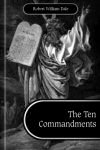
Robert William Dale, a proponent of the civic gospel, believed in encouraging interest in politics amongst his congregation and that “the law of Christ is to be illustrated in the legislation and policy of the state.” His treatment of the Ten Commandments details the practical implications of each ordinance on the lives of the everyday Christian. Dale also discusses the implications of the Commandments for local and national politics, offering a glimpse into the civic gospel movement in nineteenth-century England.
Robert William Dale (1829–1895) was educated at Springs Hill College, University of London, University of Glasgow, and Yale University. He is the author of The Epistle to the Ephesians: Its Doctrine and Ethics. Dale primarily pastored Carr’s Lane Chapel from 1854 to 1895, and later went on to become chair of the Congregational Union of England and Wales.
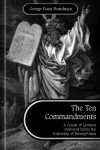
Baptist minister and missionary George D. Boardman treats each of the Ten Commandments in this volume and addresses young Christians. Boardman considers the Commandments to be the “foundation-stones of authoritative morality” and “true society.” He offers his thoughts, based on 30 years of ministry, on how the Commandments are integral to the cultivation of a mature Christian life and understanding human nature.
George Dana Boardman (1828–1903) was the son of missionaries George Dana Boardman Sr. and Sarah Hall Boardman. Born in Burma, Boardman studied at the Newton Theological Institution and then pastored the Barnwell Baptist Church in South Carolina—a position which he lost due to his abolitionist views. He was eventually president of the American Baptist Missionary Union. His Titles of Wednesday Evening Lectures represents a commentary on the whole Bible, compiling nearly 1,000 lectures delivered between 1865 and 1880.
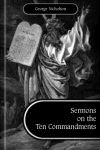
Nineteenth-century Anglican minister George Nicholson works through the Ten Commandments in 12 sermons. “This law runs through all religions however different they may appear,” Nicholson argues. His work digs into the universal usefulness of the Commandments in living a fruitful life. Nicholson preaches how Christ “confirmed, exalted, and made easy” the law of Moses through his life, death, and resurrection.
George Nicholson was an English minister and curate of Little Budworth, Cheshire. He is also the author of An Address to Deists, Evangelical Discourses, and Sermons Preached at Halifax.
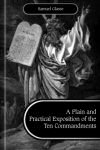
In this early nineteenth-century exposition, English minister Samuel Glasse discusses the Christians’ duty to God in a covenant of grace in which God is ever faithful and man “engages to lead a life of holiness and obedience to the will of God.” Glasse’s sermons are “plain, familiar, and practical,” providing a glimpse into religious life in England as it began its rise to global hegemony.
Samuel Glasse (1735–1812) was rector of Wanstead, Essex.
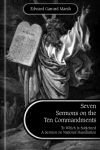
In these seven sermons, Edward Garrard Marsh combats both antinomians and legalists, defending the law of Moses as an instrument of conviction for unbelievers, and a code for Christians to joyfully submit to. Marsh makes three overarching claims throughout this book: that God’s law should control Christian behavior, that the Ten Commandments summarize God’s law, and that studying the Commandments yields fruit for all men—Christian or not.
Edward Garrard Marsh (1783-1862) was an English poet and Anglican clergyman, son of the composer John Marsh. He is the author of The Christian Doctrine of SanctificationGarrard was a good friend of both William Hayley and William Blake. He studied at Wadham College, Oxford, and on graduating became a fellow of Oriel College, Oxford. He was a curate at Nuneham, and then bought a chapel in Hampstead. He became residentiary canon at Southwell. He was vicar of Sandon, Hertfordshire and then Aylesford, Kent.
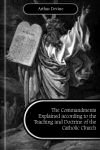
Seeking to outline “all the obligations of Christians, natural and supernatural” Catholic theologian Arthur Devine analyzes the Ten Commandments as the root of moral theology. Devine draws on Scripture, tradition, and the teachings of the Church. His goal is to teach all Christians how to understand and apply the principles of the Commandments to every facet of daily life for themselves. His work is a readable presentation of Catholic doctrine and its application to Christian life in the early twentieth century.
Arthur Devine, CP (1849–1919) wrote Convent Life: The Duties of Sisters Dedicated to the Service of God, The Creed Explained: An Exposition of Catholic Doctrine, and A Manual of Ascetical Theology.
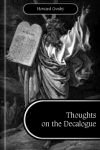
“Although God has thus frequently spoken to men, he has but once written a message to his creatures.” Howard Crosby’s reflections on the Ten Commandments are centered on their unique status as God’s literally written word, delivered to Moses on Mt. Sinai. Crosby reflects on how the Ten Commandments are helpful for all men, and useful as the foundations of civilization.
Howard Crosby (1826–1891) is also the author of The Book of Nehemiah and Expository Notes on the Book of Joshua. He was educated at New York University before becoming the pastor of Fourth Avenue Presbyterian Church in New York.
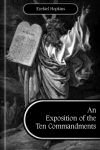
Reprinted from Ezekiel Hopkins seventeenth-century text, this volume clearly reflects the theology of the Reformation. Hopkins was a respected preacher and writer, adept at delivering complex doctrine through simple expression that brought the truth of Scripture to bear on everyday life. Hopkins works through each commandment individually, also introducing the context and importance of the Commandments within the Bible and human history.
Ezekiel Hopkins (1634–1690) grew up in the Church of Ireland where he was a chorister for about five years. He studied at Oxford and graduated in 1656, living in England as a preacher after that. The Act of Uniformity of 1662, a set of rulings requiring uniformity in the Church, directly affected Hopkins, and he conformed to the Church of England. Later in life he became Bishop of Londonderry. His works are collected in The Works of Ezekiel Hopkins (4 vols.).
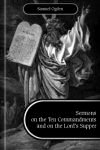
These 23 sermons from English minister and professor Samuel Ogden applies the doctrines of the English Reformation to the Ten Commandments. Also included is a biographical sketch of Ogden and a defense of his writings, as well as five of his sermons on the Lord’s Supper.
Samuel Ogden (1716–1778) was born in Manchester and studied at King’s College, Cambridge. He was eventually appointed the Woodwardian Professor of Fossils at Cambridge. He also served as rector of Lawford, Effex and of Stansfield, Suffolk.
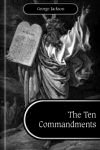
Preached on Sunday evenings in the winter of 1896 to his congregation in Edinburgh, these sermons are filled with practical insights applying the Ten Commandments to the Christian life. Jackson seeks to remind his congregation about the weight the Decalogue carried with the Jewish people, and the weight they should still carry for Christians today.
George Jackson was a nineteenth-century Scottish theologian.
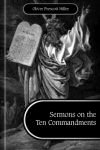
In these 12 sermons, English minister Oliver Prescott Hiller examines each of the Ten Commandments. Also a poet, Hiller’s sermons are dramatic and eminently readable. He succinctly captures at once the grandness of the Commandments in God’s plan and their significance to the smallest details of human living.
Oliver Prescott Hiller (1814–1870) was an English poet and minister of the New Jerusalem Church in London.
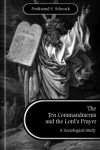
Ferdinand Schenck’s sociological study views each of the Ten Commandments as “an authoritative statement of a fundamental principle of human nature.” Schenck seeks to reveal how the behavior and achievements of men through the centuries are marked by God’s law, testifying to our “divine origin.” Schenck explores how the glory of God and the nature of man is “set forth in this law and prayer of our being.”
Ferdinand S. Schenck (1845–1925) was professor of pastoral theology and sacred rhetoric at the Theological Seminary at New Brunswick. He is also the author of Expository Sermons on the Heidelberg Catechism.
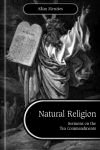
In these 13 sermons, Allan Menzies addresses each of the Ten Commandments and focuses especially on how they serve as the foundations of human society. Throughout each sermon, Menzies emphasizes the sorrowful state of the human race before the intervention of God’s law and how societies grounded in the Decalogue have flourished. Menzies sermons are eminently readable, clearly and concisely speaking to Christians of all knowledge levels.
Allan Menzies (1845–1916) is also author of The Earliest Gospel: A Historical Study of the Gospel according to Mark, The Second Epistle of the Apostle Paul to the Corinthians and editor of the ninth volume in Philip Schaff’s Nicene and Post-Nicene Fathers series. He was professor of divinity at the University of St. Andrews in Edinburgh, Scotland.
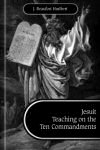
In this brief volume, J. Beaufort Hurlbert presents and critiques Jesuit teaching on the Ten Commandments. Beaufort utilizes a question and answer format, in which he answers questions about the Commandments with quotes from Jesuit teachers, adding his own critical commentary.
J. Beaufort Hurlbert (1812–1891) was a nineteenth-century Canadian theologian.
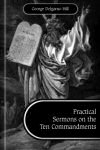
In this collection of 11 practical sermons on Exodus 20:1–17, G.D. Hill explains how each of God’s laws are for our good, as God “requires nothing from us but what will tend to our happiness.” Hill’s pastoral voice explains how each commandment is designed for human flourishing, and his work is filled with practical wisdom for applying the principles of the law to every area of Christian life.
George Delgarno Hill was assistant curate of Hanover Chapel, London. He also wrote Scenes of 1792: A Tale of Revolution.
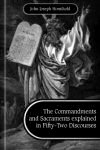
In this volume, Catholic bishop John Joseph Hornihold examines the Ten Commandments and the Catholic doctrine related to them. Hornihold offers a wealth of practical insights into living out the Commandments, drawing on the teachings of the Church Fathers and Scripture. He encourages Christians to be diligently seeking to bring their lives within the bounds of God’s good design.
John Joseph Hornihold (1706–1778) was Roman Catholic bishop of Philomel. He also wrote The Real Principles of Catholics.
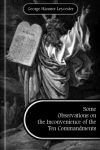
In this satirical work, George Hanmer Leycester examines the “inconvenience” of each of the Ten Commandments. Putting on the air of a man who has decided the Ten Commandments are antiquated shackles on the enjoyment of life, Leycester subtly critiques those who would argue against the importance of God’s law in society and throughout history. His work is a charming piece of eighteenth-century English comedy that is eminently readable and quotable.
George Hanmer Leycester was an eighteenth-century Oxford scholar and lawyer.